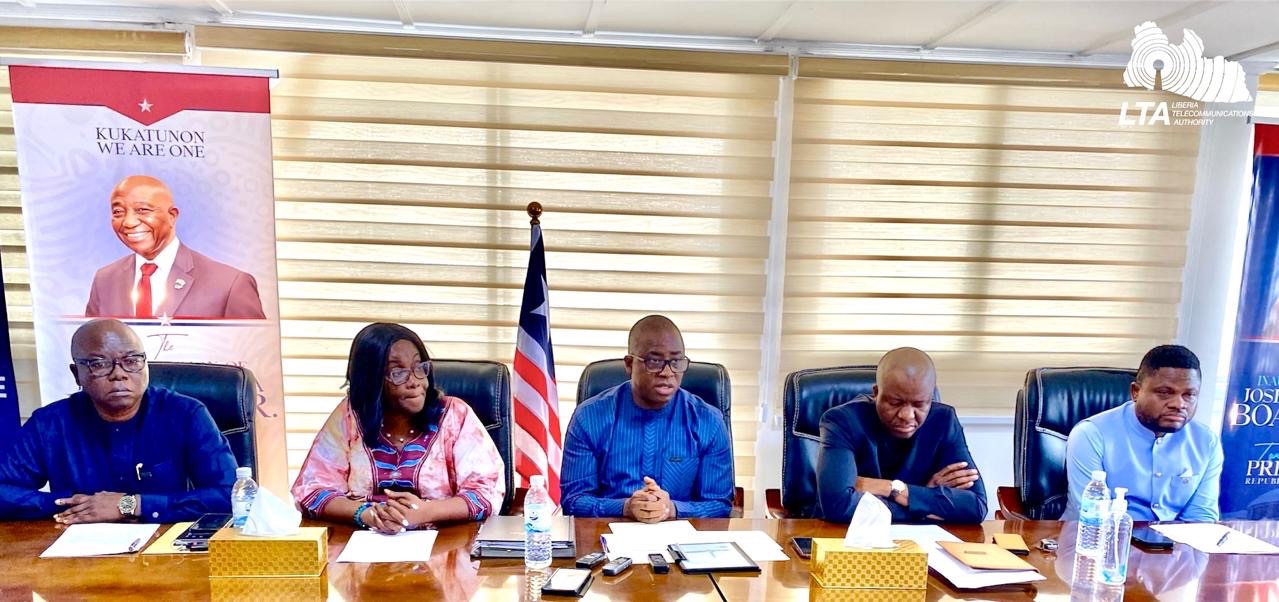Monrovia: The acting board of Commissioners of the Liberia Telecommunications Authority (LTA) on Monday signed the first-ever regulations under their tenure which marks a historic chapter for Liberia’s telecommunications sector.
The two instruments sealed by the LTA include, “the Numbering Regulation which includes a revised Numbering Plan” and the “Wholesale Access to Telecommunication Network for the Provision of Value-Added Services referred to as VAS.
“These groundbreaking regulations are poised to significantly enhance opportunities for Liberian entrepreneurs, improve service quality, and boost government revenue”, Abdulla Kamara, acting Chair, board of commissioners, LTA.
The numbering regulation introduces a revised numbering plan that provides a comprehensive framework for the efficient allocation, assignment, utilization, and management of all telecommunication numbers, including Short Codes, nationwide.
“Previously, Mobile Network Operators (MNOs) had full control over the assignment and pricing of Short Codes, often charging exorbitant fees. This lack of regulation created an unfair market, particularly for those entering the Mobile Money Market. The new Numbering Regulation changes this dynamic, making all Short Codes a national resource managed by the LTA. This ensures equal access for all applicants on a first-come, first-served basis, with clear guidelines and standards.
The revised Numbering Plan categorizes Short Codes into 3-digit to 6-digit codes, with specific provisions for Toll-Free, Premium, and other specially assigned numbers. The regulation eliminates exclusive perpetual rights to numbers, promoting effective competition and transparency. The application fee for Short Codes is set at USD 25, with an annual authorization fee of USD 150, except for the limited 3-digit Short Codes, which have a USD 1,500 authorization fee”, Kamara told a news conference Monday.
This new framework, according to the LTA, decentralises control over this scarce national resource, fostering competition and opening up business opportunities for smaller entrepreneurs, especially Liberians.
The second component which talks about the “Regulations on the Wholesale Access to Telecommunication Networks for the Provision of Value-Added Services” (VAS), further supports this goal.
VAS Regulation mandates MNOs to provide access to Short Code businesses, ensuring fair market cost-based access for these businesses to reach their customers through MNOs, and promoting sustainable wholesale access to non-telecom services.
LTA’s second introduced regulation is the “Wholesale Access to Telecommunication Network for the Provision of Value-Added Services”, referred to as VAS for short.
The Telecommunications regulator of Liberia informed newsmen at its headquarters in Paynesville Monday, that the VAS Regulation sets forth the criteria for fair market cost-based access for Short Code businesses to reach their customers through the MNO’s.
Commissioner Kamara is quoted as saying, the “VAS Regulations facilitates the development of the telecom sector It also provides guidelines for Aggregators, who are mediators for smaller Short Code users to gain access through the MNO’s promoting sustainable wholesale access of non telecom services.
The MNOs are declared, Essential Facilities. This means, they are the ONLY means through which businesses may access their customer base thus the regulations require that MNO’s MUST give access to Short Code users.
Short Code businesses are classified as ‘Non facility based,’ meaning they do not have a network of their own and are not in the position to build one. The VAS Regulationtherefore mandates MNOs to provide access”.
Over the next several months, the LTA has put in place a transitional arrangement requiring all numbering resources active or reserved to transition to the LTA after which the LTA will determine the numbering authorization fee.
This is a period during which MNO’s will use to transfer their control and terminate their contracts with Short Code businesses they presently have agreements. We have no interest in disrupting the market.
Mr. Kamara concluded that the essence of these two distinct regulations is to open up opportunities for smaller businesses and encourage Liberian participation in the ownership, control, and management of the telecom industry.



